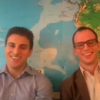The 1,000 interview celebration
On August 4, 2008, I posted a video up on Mixergy where I looked up into the web cam on my computer and I said "I failed." And I said that I was going to shut down my invitation business and start doing interviews with entrepreneurs and people in general who I admire so I can learn from them and take back what I've learned from them to build a more successful company in the future. And I said that along the way you'd get to watch and learn as I learned directly from my heroes. We did it.
A thousand interviews later here I am today bringing back some of the most memorable and most influential interviewees.
How a former lawyer built a multi-million dollar company that teaches social skills
Jordan Harbinger is the co-founder of The Art of Charm, a company that teaches confidence and emotional intelligence.
HearAndPlay.com: Turning $70 Into A Multimillion Dollar Instruction Web Site
How does a high school senior from the inner city turn $70 into a multimillion dollar instruction web site?
Jermaine Griggs is the founder of HearAndPlay.com, which trains musicians to play by ear, trains them to play by ear with online music lessons and piano video tutorials.
Andrew’s process for overcoming entrepreneurial stagnation
A few weeks ago, Andrew was interviewed about his inner doubt by Samantha Alford of WomeninBusinesspodcast.com. I (Arie Saint) thought it was too good not to share with our audience, so I’m publishing it on Mixergy.
How To Produce Like A Linchpin By Understanding Your Lizard Brain
You listen to my programs because I don’t do the cute “let’s get to know the author” interviews that others are known for. I hunt down information that you can use because I’m passionate about helping you build a business that your great-great-grandkids would admire you for.
That’s why I kept digging in this interview. I want you (and me too, frankly) to be able to produce the kind of hits that Seth Godin keeps cranking out, seemingly without breaking a sweat. Not only has Seth created 2 big hit businesses, but he’s a writer who keeps introducing ideas that shape the way people think.
iContact Founder Returns To Mixergy After $169M Sale
How does a wristband help a founder build a $169 million company?
Ryan Allis is the founder of iContact, a provider of email marketing tools for small businesses. And a company that was recently sold for $169 million to Vocus.
Here’s a quote from the last time I interviewed him, “we incorporated in July ’03, lived in the office, slept on futons, cooked on a George Foreman grill, did whatever we had to do to keep expenses low, while we built up revenue and customers, and improved the product.”
How Clever Entrepreneurs Turned 3 Air Mattresses Into Airbnb, The Site That Makes Any Home A Bed And Breakfast
The founders of Airbnb are guys who couldn’t make rent a few years ago, but they kept turning desperation into creative solutions. In October 2007, eager to make extra money, they noticed that local hotels were booked up because of a conference. So they pumped up some inflatable mattresses and listed their place online as an “air bed and breakfast.” It was quirky and it worked. That little act of creativity became Airbnb, the (profitable) site that allows anyone to list their extra space for rent.
Reddit Founder: “I Wish I Still Owned Reddit Now”
Many founders I interviewed on Mixergy told me about how their companies virtually disappeared after they sold them. But 4 years after selling Reddit to Conde Nast, Steve Huffman is so proud of how much its grown that he’d be happy to still own it.
I asked him to teach me how he grew his community, why some Y Combinator-backed founders, like him, succeed while others don’t get any traction and why he never resented his co-founder for getting so much attention.







